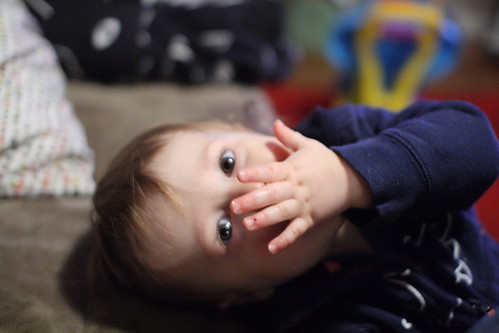Sophia’s at the stage where she’s experimenting with language. She didn’t start talking properly until she was about two-and-a-half-years-old (we think the delay may have had something to do with the birth of her brother – they say that young children can regress slightly when a big life event like this happens), but now she’s a real little chatterbox. If I may be so bold, she's also a little bit of a bossy boots. I love it.
It’s wonderful to hear her chattering away but my husband and I have had to face a real fear recently - what do you do when language 'turns bad’?
The other week, we were all sat around a table eating our dinner. We were having a whale of time, not least because the chair I was sitting on kept squeaking when I moved. Sophia thought it was hilarious. She tried to do it herself and squealed, “I farted!"
What do you do? What do you say?
I know this particular f-word is not the most vulgar but still, I’d rather she got a good grasp of linguistics and an understanding of when it is and is not appropriate to say certain words first before coming out with anything that could be construed as offensive by an eavesdropping passer-by.
In that particular situation, I stuttered slightly and made out she had said an incorrect word. “I think you mean that you trumped. That’s the right word.” Sophia’s not repeated it since and I’ve made sure that everyone she sees regularly has been reminded to watch their language around her.
It was some comfort at least to find that I’m not the only one starting to face this challenge. In some cases, other parents have had to deal with much worse.
I was with a friend of mine recently talking about this very subject. She told me that her three-year-old child (let’s call him Peter) recently said “f***” (you know, that very naughty f-word). She put the blame squarely at the feet of her aunt who would repeatedly swear in front of children, despite numerous tellings-off.
I asked how she dealt with it. She said that she decided to ignore it completely, pretend as if the word hadn’t been used in the first place. Her first instinct was to tell Peter off, but she thought that he might associate the word with getting some degree of attention, making him likely to say it again. She said that, by ignoring it completely, Peter hadn’t repeated the word since. (She’s also had another word with her aunt about the swearing who has since been trying hard to moderate her language).
Another friend told me that her four-year-old is starting to understand that there are such things as ‘naughty words’. “He’ll say something, then put his hand over his mouth and say ‘oh, that’s a naughty word’ even though it never is.”
So, how do you cope when your child starts to understand aspects of our language that we’d rather not encourage? What do you do? Answers on a postcard please!


Everyone must have to deal with this at some point.
ReplyDeleteI do remember when my boys were nursery age a very red-faced mum insisting to the nursery teacher that her small son had been 'trying to say "truck"'!
We employed different methods with our children because we knew they would all act differently depending on our response. One we ignore and that works, one we have to remind them that we do not use words like that in this house nor do we want to hear you using them outside of the house. Another told his mate to f******* when he was 5yrs old, I made him apologise to his friend (with his mother present) and asked him where he had heard the word because we don't use words like that and he sparked up '"Oh he told me it in the toilet" pointing to friend he had just apologised to!!!!! (he has now moved on to finger gestures - the latest on the playground - a good glare seems to do the trick if we see his finger twitching. And lastly but not least the youngest is only 2 so we have all the joy of working out what will and won't work with her. I am sure we will face more words that will shock us and we will have to be consistent and persistent. Good luck
ReplyDeleteIt really is a minefield!
ReplyDeleteThanks for your comment. I guess we all have to feel our way through it and find the technique that works best for each particular child. Would be much easier if there was a 'one size fits all' approach though! x
ReplyDelete